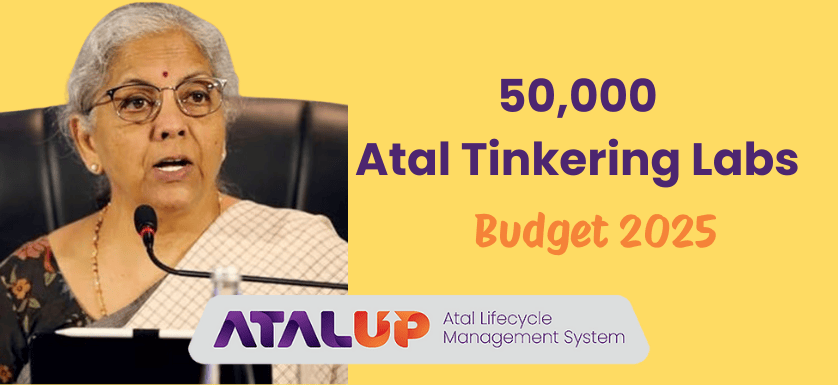
India is gearing up for a major leap in school-level innovation. The announcement of 50000 Atal Tinkering Labs in budget 2025 has sent a clear message; innovation is now a national priority. This move will create a stronger foundation for a generation that thinks beyond textbooks and brings ideas to life.
Our Finance Minister Shrimati Nirmala Shitharaman announced 10,000 Atal Tinkering Labs in 2016 and has successfully established 10,000 labs. NITI Aayog and Atal Innovation Mission have successfully upgraded the landscape of STEM education throughout India. In the next 5 years, 50000 schools will be able to run STEM experiments in their schools and prepare future startup leaders.
What Does “50k ATL Labs” Mean for Schools?
With 50k ATL Labs announced in Budget 2025, every district, town, and even remote village now stands a chance to become a hub of STEM innovation. Schools that never imagined having access to high-end tech like 3D printers, sensors, and AI kits will now get ₹20 lakhs each to set up and run their own ATL Lab.
This includes ₹10 lakh for one-time setup and ₹2 lakh per year for five years to manage operations, training, consumables, and activities.
“ATL Labs – India’s New Startup Nurserie”: PM Narendra Modi
At the Madhya Pradesh Startup Conclave, Prime Minister Narendra Modi called Atal Tinkering Labs the nurseries of startups. He emphasized that ATL Labs are shaping young minds to think like innovators, problem-solvers, and future founders.
He also highlighted the launch of Atal Incubation Centres in colleges, which will act as a bridge for ATL students to continue their innovation journey beyond school. This seamless transition from tinkering in schools to incubating in colleges will allow students to build real startups, grounded in STEM education.
PM Modi also once expressed the joy of communicating with Atal Tinkering Lab students and listening to their amazing innovation stories. He said that he did not want that call to end. It was so inspiring to see young learners smartly design excellent solutions for extremely critical challenges.
How 50,000 ATL Labs Will Change the Game
For years, only a few thousand schools had ATL access. Now, with 50000 Atal Tinkering Labs, the reach multiplies. More students will explore real-world problems, build prototypes, and even pitch ideas to national platforms. It’s no longer about studying science, it’s about doing science.
Indians are naturally creative and resourceful. We’ve seen this on the global stage, take ISRO’s Mangalyaan mission, for example. It was launched on a shoestring budget, yet earned worldwide respect. That same spirit of innovation lives in our students, waiting to be unlocked. With Atal Tinkering Labs, we are giving young minds access to tools like robotics kits, sensors, and 3D printers, tools that were once limited to top tech labs.
These labs don’t just enhance learning, they transform it. Instead of just reading theories, students are building real-world models, testing ideas, and solving everyday problems through experimentation. ATL bridges the gap between textbook concepts and their actual application, making learning relevant and exciting.
More importantly, ATL lays the foundation for an innovation-led future. With hands-on exposure to AI, robotics, and coding at an early age, students are not just learning skills, they’re preparing to lead. They’re designing prototypes, launching mini-projects, and even exploring patent-worthy ideas.
In a country like ours, where talent is abundant but early exposure has always been a barrier, Atal Tinkering Labs are unlocking a new era. One where school students become creators, not just learners.
A Golden Chance for Private and Rural Schools
Private schools and trust-run institutions often miss out on government schemes due to documentation gaps or lack of awareness. With the 50000 Atal Tinkering Labs announced in budget 2025, they now have a second chance. ATALUP is already guiding several schools through eligibility checks, documentation, and online applications to make sure they don’t miss out again.
India’s Innovation Network Just Got Bigger
The impact of 50,000 ATL Labs isn’t just in numbers. It’s about creating a connected ecosystem where students from every region can solve real problems using tech. Rural kids can work on smart farming. Urban students can design sustainable transport. And all of this happens within the school itself.
Now with incubation support lined up in colleges, the entire innovation journey, from school to startup, is becoming a reality.
What Schools Should Do Now
The window to apply is limited. Schools must act fast, organize documents, and plan their ATL strategy. ATALUP is onboarding schools to streamline this process and help them become future-ready.
The government will shortly start ATL registration for 2025 and ATALUP is already offering Free Consultation to schools from every corner of India.
For any information about the Atal Tinkering Lab, we have you covered:
Atal Tinkering Lab Registration
Final Words
ATALUP is helping schools tap into this opportunity by offering end-to-end support for application, setup, training, and reporting. With 50k labs rolling out, structured execution is the need of the hour, and ATALUP makes that easy.
50k ATL Labs announced in Budget 2025 is more than a headline, it’s a movement. A movement to make innovation accessible, inclusive, and impactful. Schools that seize this moment will not only receive funding but also unlock the potential of their students like never before.